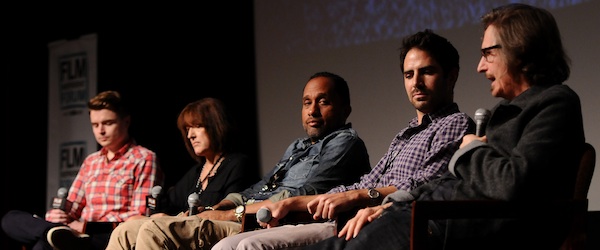“Running a Show Is Like Childbirth:” What It Takes to Launch a Series

We are living in a golden age of television; never before has there been such high-quality TV, nor so many choices. At October’s Film Independent Forum, we presented a panel of top showrunners, writers and producers of current series to talk about what it really takes to launch a show. Indiewire’s TV editor Ben Travers moderated the panel, featuring Nicole Yorkin, writer and executive producer on The Killing; Jake Avnet, COO of Indigenous Media and executive producer of WIGS; Kenya Barris, creator and executive producer of Black-ish; and Ray McKinnon, creator and executive producer of Rectify.
The panelists came from diverse backgrounds, all of which continue to inform their work. Yorkin used to be a journalist. McKinnon is also an actor. And Barris has worked in all different genres and formats. “I realized from all the different things I had done—in doing sketch, in doing drama, in doing reality—they all teach you something different,” he said. Avnet works primarily in the digital space, which he says he fell into when he got out of college. “I just happened to be in digital sort of by accident in the very early days of that,” he said. “I think it’s an incredibly interesting time to be a content creator in general, but particularly in digital.”
When Travers asked everyone how they got their starts, and whether they got into the business using industry contacts, some acknowledged that mentors had had a major impact on them. Barris makes a point of paying it forward: “It has been such village that helped bring me up,” he said, “I feel compelled to always have a few lower level writers who we try to reach out and get them started.”
When the question got to McKinnon, he enthused, “Networking! Oh, yes! I live by networking!” After the laughs died down, he admitted that it actually had never been his approach. Though he knows networking can be effective and important for others, he insisted that just doing good work is also a way in. “A lot of people out in the business are looking for good story and good scripts, and they will find it. There’s not a conspiracy to prevent really good writing from coming into Hollywood.” Yorkin agreed: “If you work at your craft, if you’re really a good writer, you will get your opportunity.”
Travers asked about dealing with criticism and audience reaction. “If you pay too much attention to the audience that you think is out there, it can be inhibiting to what it is you’re creating,” Yorkin warned. She and Barris both had bad experiences with vile Internet commenters after a series finale and before a series premiere, respectively, and agreed that you just have to learn to tune out the haters. “If you listen to that sort of negativity, it’s hard to be creative,” Yorkin said. “People don’t really know what they want until you give them something,” Barris added, “and if you can be honest and clear with your vision, people will see it.”
Avnet agreed that the audience doesn’t always know what they want, but working in the digital space gives him a different take. “We have more comment action and audience data than we know what to do with,” he said, “which is both a blessing and a curse.” While he agreed that content creators ought to stick to their vision, he added, “If there’s an avalanche of sentiment in one direction, you have to sort of take that into account.” After all, with no audience, there can be no show.
“It’s the hardest thing in the world to try to run a TV show,” Yorkin said. “It’s like childbirth. You can be right next to it, but until you’re the one giving birth, you don’t know what it’s like.” It takes a special kind of person, too. Travers asked all the panelists what they think is the most important trait in a showrunner, and Yorkin and Avnet agreed that he or she needs to be something of a jack-of-all-trades. “For me, stamina,” Barris said. “Really, you’re the only one who can get certain things done. That’s the biggest thing I didn’t foresee, just the pure amount of time and energy.”
“For me, it’s like, trying to keep everybody that I’m working with off-balance and living in a constant level of fear,” McKinnon joked. As an actor on Deadwood and Sons of Anarchy, McKinnon learned a lot from watching David Milch and Kurt Sutter at work on those shows. Yorkin stressed the value of collaboration: “I think you get a lot from having writers in the room and getting to listen to other people’s ideas,” she said, to which Barris added, “As a showrunner, it’s not a bad thing to be the dumbest person in the room. Just know what you want, and have other smart people that can help you execute it.”
“It’s difficult!” McKinnon admitted. “It is the hardest job I’ve ever done, by far—but it’s the greatest job I’ve ever had.”
Mary Sollosi / Film Independent Blogger